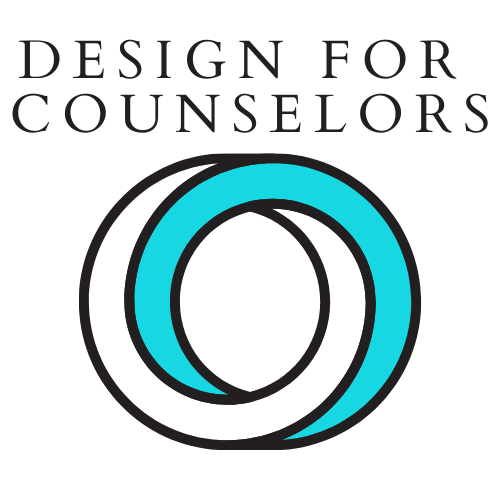5 reasons why your website is not bringing you the results
When you go to school to become a therapist, counselor, or coach, you don’t learn the basics of marketing, website design, or entrepreneurship. You learn psychology and counseling theory.
You may not even know you need a website or that it’s essential to your business. And if you’re like many of my coaching clients – therapists and counselors who wanted to increase their clinical hours but didn’t know how to market themselves – you might not even have much of an online presence.
This post isn’t for everyone. But if you’re looking for more clients and are open to learning some basics about what it takes to be successful in business, this article is for you. So much of building a thriving mental health practice is about marketing, and it’s just one slice of that pie, but it’s an important piece.
As a website designer and marketer, I’ve worked with therapists on their websites for over seven years on both sides of the consulting desk.

Photo by Brooke Cagle on Unsplash
1) Your website is irrelevant if it doesn’t offer what people want or need
You’re telling me a lot, but you don’t show me what I’m looking for over the years. I have seen many private practice websites that tell me how good they are but do not have any examples of their successes or how they can help. Think of this from the potential client’s point of view. If a potential client sees a website full of information but no relevant information relatable to their needs, how will they know if the therapist can really help them? It’s not enough for a potential client to see that you’re registered with the board or that your clinical hours are up-to-par. You have to show people that you can help them.
Some important elusive obvious questions are:
What happens at our first encounter?
What happens during emotional sessions?
I am or identify a person of color / queer / neurodiverse / differently-abled / etc.
Can you really help me?
Can I trust you?
2) It’s either poorly structured or out of date
Have you ever been to a website that was so poorly structured and out of date that it made you want to leave?
It’s not just frustrating for the user but also bad for business. If your site isn’t structured as well as it should be, people aren’t going to stick around long enough to find what they need or even understand why they would go back in the future. And when people don’t come back, nobody wins.
When a potential client is searching for your services, they are likely in an unhappy state. So difficult to find information on your website can make them feel even more frustrated and want to leave together.
I recommend updating your offerings to reflect any changes or updates in your counseling approach, insurance providers you accept, or even new training. It’s also worth noting that an old or untidy site could be linked to old or broken links, which will immediately turn potential clients away. And if you don’t have the time to keep your site up to date.

3) It’s monotonous or unattractive to the eye.
Designing a therapist’s website is not as easy as some may assume. You have to make your therapist’s website attractive enough for people to want to look at it but also professional enough, so they know you are credible and trustworthy.
You must first understand your target audience when it comes to building a unique and memorable website. Are you writing for other doctors or potential clients? This is something I assist therapists with when we’re discussing an overall marketing plan.
Who do you plan to market to; Other clinicians or patients?
It all depends on who you are trying to attract. For example, if you want to attract other therapists, your therapist’s website needs to be more professional than if you wanted to attract patients.
5) There are unnecessary distractions (and no call to action)
Now that you’ve had a beautiful and memorable website and clients are ready to get started, are the steps to action clear?
When designing a therapist website, therapists should keep in mind that prospective clients may not know everything about therapy or if they really need it. Lengthy websites can be a deterrent for someone to start the process of discovery. To remedy this, therapist websites should have a clear path to action, whether it is “call now” or “schedule an appointment” or something else that is clear and concise.
I get it, you are a therapist, not a salesman, and you don’t want to sound or be saley.
Make it as easy as possible to close the sale. If you are trying to sell your services, write like it. Don’t waste time with flowery language, don’t bog people down with textbook jargon and therapist speak. Your therapist website should be clear and straightforward so that someone can understand what you do in plain English.
You might be thinking that you’ve done everything right, but if your website doesn’t offer what people want or need in a way they can understand, it’s irrelevant. Plus, there are many other things to consider when creating an effective digital marketing strategy for your business. Let me know how I can help! I’ll get started on bringing your website up to date and making sure the content is well structured so that customers find it easy to use. What do you think? Is this something you’re interested in working with me on?
4) There’s too much technical language.
If you audience is other clinicians, this is perfect but if your audience is potential clients, an overly technical text will alienate them. Keep it simple and to the point. It might be possible for some clients too, but the average person isn’t going to understand most of it and may lose interest and leave.
Avoid using jargon. It may be necessary to use terms particular to the orientation you practice, but limit this as much as possible and define their meaning in a way your audience will easily understand.
Your website should be informative and easy to understand for all visitors, regardless of their background. If they have to stop and think about what you’re saying, they may become bored and simply go to the next psychologist’s website. We want to eliminate as many obstacles as possible for potential customers to pick you

What do I offer?
- To assist you in discovering your unique voice (You want your website to be a representation of you)
- Identify your audience (Knowing your target audience will help you figure out how to reach them.) and target keywords to use on your site.
- A beautiful design ( photos and graphics to help your content stand out.)
- Do all the technical lifting if needed (Registering your domain, Implementing SEO strategies, and Building your website)
How does it work?
I have four web design packages based on how involved in the process you want to be. I have it broken down into 3 overarching steps:
Discovery: The first stage in developing your therapy website is to discuss your practice and who you want it to appeal to. I’d like you to complete my website planning checklist so that I can understand your approach and design preferences. The more I can understand about your unique practice, the more I am able to personalize your site, so it is an accurate reflection of your practice
Refine & Prototype- after discussing your practice and design preferences, I will create a wireframe draft or graphic concepts for you to review online. This will either be a direct link or a graphic file that will be emailed to you to review. After I receive your feedback, what you like, don’t like, and other changes you would like. It might take up to three iterations of revisions to shape your website to reflect your own distinct style and attract the ideal clients
Live Launch- Now that we have refined your website using your feedback, I will show you the basics of managing and performing essential updates to your website. You’ll receive 30 days of maintenance support. I offer additional maintenance services; contact me for more information
